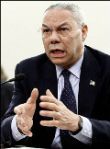INTERVIEW- Powell says Darfur no safer after genocide label
By Saul Hudson and Arshad Mohammed
 WASHINGTON, Sept 14 (Reuters) – Sudan must do a lot more to make its Darfur region safer, U.S. Secretary of State Colin Powell said on Tuesday, adding that Khartoum had failed to improve security since the United States last week accused it of committing genocide there.
WASHINGTON, Sept 14 (Reuters) – Sudan must do a lot more to make its Darfur region safer, U.S. Secretary of State Colin Powell said on Tuesday, adding that Khartoum had failed to improve security since the United States last week accused it of committing genocide there.
The top U.S. diplomat, who has driven an international campaign for Sudan to stop backing Arab militia attacks on villagers, also said a threat of U.N. sanctions was key to pressuring the oil-producing nation to act.
“I hope they realize that they need to get out of a situation they find themselves in. They need to get out of being seen by the world as responsible for the death of tens upon tens of thousands of people,” Powell told Reuters.
While the genocide finding had little legal import, U.S. officials hoped it would erode opposition to their push for sanctions and spur Sudan to stem the violence that the United Nations estimates has driven 1.2 million from their homes and killed as many as 50,000.
Asked if Sudan had sought to improve security since he told Congress on Thursday that genocide had occurred, Powell said: “Not really. They have to do a lot more.”
Sudan has denied backing the Janjaweed militia and says the U.S. genocide accusation, which has not been echoed by other major powers, panders to the black vote in a presidential election year.
Rebels began an uprising in Darfur in February 2003 after years of skirmishes between mainly African farmers and Arab nomads over land and water in the arid western area as large as France. The Islamic government turned to the militias, drawn chiefly from the nomadic Arab population, to help suppress the rebels.
Washington has been criticized at home for doing too little to stop the world’s worst humanitarian crisis. But it still faces opposition at the U.N. Security Council to a U.S.-drafted resolution threatening Africa’s largest country with sanctions on its oil sector if it does not stop the atrocities.
Opponents in the council include Sudan’s oil customers China and Pakistan.
Powell dismissed concern the genocide accusation, which the United States had not made during any other conflict, could backfire by stiffening Sudanese opposition to international pressure.
“I don’t think it was counterproductive. I think the Sudanese heard it quite clearly,” he said.
